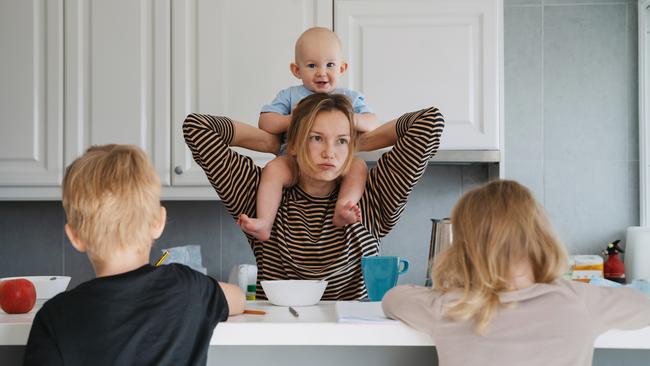‘Many mothers today berate themselves’: The simple mistakes mums make
Parenting is hard enough but there’s one thing mums do that they can’t forgive themselves.

QWeekend
Don't miss out on the headlines from QWeekend. Followed categories will be added to My News.
There is a never-ending stream of parenting bibles that claim to know how we should all be raising our children.
The general gist has been to embrace, accept and validate all your child’s emotions, whenever they make an appearance, with little mention of how you do that when you can barely contain your own.
How on earth are you supposed to continue with that approach when your child has triggered shame, embarrassment and rage, often in some sort of very public and humiliating experience. Many mothers today berate themselves for expressing any of those apparently unacceptable emotions in front of their children.
But I can’t help but wonder, what are we really teaching our children about those emotions if we see them as unacceptable in ourselves?
Perhaps allowing yourself to be as human as you allow your kids to be means acknowledging how we feel, and doing what we need to do in order to express it and calm down again without doing anything we regret. Or when we do make mistakes in anger, being the adult, remembering what matters most and initiating repair of the connection between you.
So if you have been driving yourself into the ground trying to do your best for your family and still you are plagued by feeling like it’s not enough, I see you, my friend. I see those times you are doing such a great job and not giving yourself credit for it.
However you might have got it wrong today, you have the most important thing intact. You love your child more than you can articulate.
And so, after you rest here for a moment, you will recalibrate, stand up and reconnect with those little people who mean the most to you in the world. And you may not see right away how much good that does, but I’ll bet it’s more than the damage you thought you had done.

Take a minute – parents have feelings too
Bringing our best to any situation can only be done when we take a moment to actively choose the demeanour and mindset that will make it possible.
Clinical psychologist Dr Becky Kennedy makes it clear that you don’t have to be emotionless to parent well. But what you must do is listen to what those emotions tell you about your own unmet needs. You then have to commit to meeting those needs that prevented you from parenting in the way you want to.
And you must repair the relationship when you do make mistakes. No need to carry any illusion that a perfect parent never gets frustrated or angry or does anything wrong.
In fact, I would argue that it is more beneficial for everyone involved if you have a human moment, then take responsibility as the adult to repair and help yourself to do things a little differently next time.
The balancing act
The friction that is felt by every parent on a daily basis is the tension between trying to equip your child for real life with all its demands, boundaries and structure, while patiently connecting with them in a way that feels like unconditional love and belonging. The speed and complexity of modern life often feels in direct conflict with the fundamental need for children to take their time and feel connected to parents.

Deciding whether to apologise
This is often a difficult thing to acknowledge, but parents don’t always feel positively towards their children. At times when they persistently behave in ways the parent finds detestable, they may even feel dislike towards them.
The shame that can follow prevents us from even being able to acknowledge it, let alone apologise for any mistakes we made. The urge is to carry on as if nothing happened, our own defences preventing us from repairing and reconnecting. Instead, we can feel a widening void between us, a distance that makes reconnection feel ever more difficult.
Many people are also apprehensive about apologising to children for fear of sacrificing some of their authority or giving the impression that the inappropriate behaviour is permissible.
But not talking openly about both your child’s behaviour and your own, and being unable to model healthy apologies without trampling over important boundaries, serves to perpetuate the build-up of resentment in parenting.
We cycle from guilt to anger and back again, treating nurture and structure as opposing forces.
We are the first generation to be exposed to the idea of modelling healthy apologies to children, and few, if any of us, were parented in that way. Our parents and their parents before them were generally taught to brush shameful acts under the carpet. If you don’t mention it, it goes away.
So generations of children have not had the chance to witness their grown-ups repairing ruptures in the relationships with them. Human relationships gain something fundamental from repair, a trusting connection that can often be more powerful than the initial rupture.

Meet my own needs? Dream on
One of the common things we feel guilty for as parents is when we burst at the seams and big feelings seem to come out of nowhere; a small spill that leaves you weeping on the kitchen floor.
These moments are not who you are.
They are signals, shouting at you to put something back in the tank because you’re running on empty.
Many people who have established a lifetime habit of parking their own needs to put everyone else first find the reality of looking after themselves tremendously difficult. Doing these things is not difficult, but feeling the guilt that comes with it is uncomfortable at best, unbearable at worst.
Your inner monologue won’t stop telling you this is a waste of time and unforgivably selfish. But we underestimate the ripple effect of doing things that enable us to bring our best selves to our loved ones.
If you tell yourself that all your mistakes will cause long-lasting damage, then you must also acknowledge that everything you do to improve your chances of not making those mistakes also brings long-lasting positives to your whole family.
Weakening yourself to strengthen others is not the optimal outcome if there is any way that the whole family can thrive.
Despite being a parent, your basic human needs are still essential and you cannot be the parent you aim to be without meeting those first.




